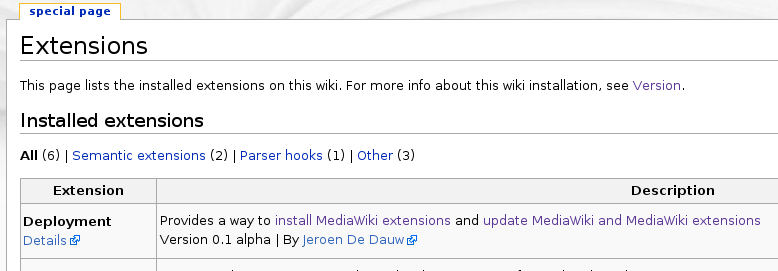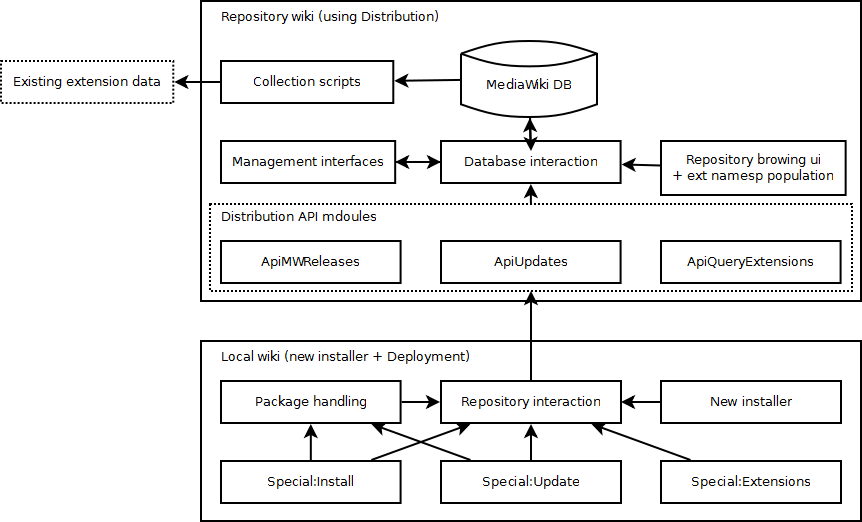As Google Summer of Code (GSoC) 2010 has ended, I’m writing this blog post to outline what I’ve done during the coding period and what the results are. Thanks go to the Wikimedia Foundation and Google for providing the opportunity to do this project, Brion Vibber, who mentored me, and to all other people who helped me out, especially Yaron Koren who I bugged the most 🙂
What I did during GSoC
My initial proposal was to create an awesome extension management platform for MediaWiki that would allow for functionality similar to what you have in the WordPress admin panel. After doing some research I realized this would require significant effort in two areas: configuration and deployment. After looking at some already existing tools such as the Configure extension and the Deployment Framework of Ontoprise, I decided to completely drop the configuration part and concentrate on the deployment work.
I started with porting the filesystem abstraction classes from WordPress, which are needed for doing any upgrade or installation operations that include changes to the codebase. (The current MediaWiki installer can do upgrades, but only to the database.) I created a new extension called Deployment, where I put in this code, and which was intended as a place to experiment with all the MediaWiki-installation side deployment stuff. As You obviously want this functionality to be part of MediaWiki itself, I wrote it with the idea of moving over the code to MediaWiki core once it was finished. It turned out that doing filesystem upgrades securely is not an easy task though, so after finishing the port, I quitted work on this as I decided to do other functionality first.
I then poked somewhat at the new MediaWiki installer, which is a complete rewrite of the current installer with a lot of new cool stuff and a totally more awesome interface. I made some minor imrpovements there, and split the Installer class, which held core installer functionality, into a more generic Installer class and a CoreInstaller. This allows for creating an ExtensionInstaller that uses the same base code, such as database, filesystem and LocalsSttings manipulation.
After this I started thinking about how to best structure a package repository for MediaWiki and extensions to get updates and new extensions from. I had a look at PEAR and CPAN, as well as WordPress, although I don’t learn a lot about the later. Apparently their repository code is not freely available 🙁 After discussion with Brion I decided to just create the repository from scratch, and started working on another extension, titled Distribution, for this purpose. I merged it together with a rewritten version of the MWReleases extension written by Chad, which already had core update detection functionality.
After the Distribution API’s where working decently I started work on the Special pages in Distribution that would serve as the equivalent of the WordPress admin panel. As I put of the configuration work, and also the file-system manipulation for the initial version, this came down to simply listing currently installed software, update detection and browsing through extensions available in the repository.
On top of my GSoC project itself, I did quite some other MediaWiki work in “my free time”. I released 5 new versions of Maps and Semantic Maps, starting with 0.6 and ending at 0.6.5. As I finally got core commit access, I also poked at some other things, such as Special:Version, which now will automatically put all extensions of unknown type in the “other” category, and will display this category as the last one. Plus misc minor improvements to a verity of extensions. This all amounts into a little over 550 commits to the MediaWiki SVN repository during the GSoC coding period.
State of the code
The Distribution extension has the infrastructure for storing and providing extension and core data via the MediaWiki API basically ready for use. It adds 4 database tables to MediaWiki:
- distribution_units: This table stores non-version specific info of ‘release units’ . Currently these unit’s are extensions only – the reason I went for a more general name is to allow for adding other things such as skins and content packages later on. The info here consist of a name, a URL, a description and a pointer to the “current version”.
- distribution_unit_versions: Entries in this table contain info about a specific version of a ‘release unit’. The info here consists of a version number, release status (beta, rc, stable, deprecated, …), release data, authors, description and some installation data.
- distribution_mwreleases: This table contains MediaWiki releases. It has been merged in from MWReleases, so all credit for it goes to Chad.
- distribution_packages: This table is not in use yet, and needs some more work. The goal is to be able to install a “package” onto your wiki which can contain multiple ‘distribution units’. This would basically be the same as Semantic Bundle is doing now, but a lot easier to set up and maintain.
The API modules added are:
- ApiQueryExtensions: Returns a list of extensions matching certain search criteria, which can include keywords, tags and authors. Only extensions with a version that has a release state acceptable for your installation are returned.
- ApiMWReleases: Gets the current MediaWiki releases. Like this distribution_mwreleases database table, this has been merged in from MWReleases and all credits go to Chad.
- ApiUpdates: This API module returns update information for the extensions you give it, and does the same for MediaWiki itself if a core version number is provided. The only info that’s returned is a version number for each unit or core, if there is an update. Otherwise nothing will be returned for that unit or core.
To populate the database with existing extension info I wrote a maintenance script “getSvnMetadata”, which goes through a local checkout of the MediaWiki extensions directory and get’s the names from the extensions. I haven’t found a good way yet to also get other extension data though.
The Deployment extension contains an abstraction layer for repository interaction and several interfaces that use this. The abstraction layer allows for supporting different kinds of repositories. The only implementation it currently has is for interaction with repositories provided by the Distribution extension. It’s also a convenient point to implement caching, as you probably don’t want to send the requests for available updates every time you view a page on the admin panel, and allows for changes to the format the repository uses without any effects in other parts of Deployment. The interfaces that are finished to some extend are:
- Special:Extensions: This page lists all installed extensions and allows you to filter on extension type. It’s based on the WordPress “plugins” page and is currently only an improved version of the extension list in Special:Version. It’s the only special page added by Deployment that can be viewed by non administrators. When logged in however, every extension has a list of links allowing you do various actions. The extension info is handled by a new class ExtensionInfo, which parses the info of individual extensions in $wgExtensionCredits, and provides a more convenient way to work with it. This allows for adding support for a new, better, extension info format later on. A planned feature for this special page is showing update notifications in each extension row.
- Special:Install: This page allows you to search through available extensions in the repository. The interface is based on the “plugin-install” page of WordPress and allows for searching extensions based on term, tag or author. After performing a search you get a list of matching extensions showing their name, version, authors, description, link to the documentation, and a link to download them. Later on this download link will be replaced by an “Install” one.
- Special:Update: This page will inform you of any updates to both core and extensions. It’s behaves basically identical the WordPress “update” page.
The extension allows you to configure several aspects of the repository interaction:
- $wgRepositoryApiLocation: This might be an obvious one, but also a very important one, as it allows you to use a repository other the the Wikimedia Foundation one on mediawiki.org, which will be the default.
- $wgRepositoryLocation: This is similar to the previous setting, but links to a web interface providing browsing capabilities through the repository, or at least some additional info.
- $wgRepositoryPackageStates: This is a list of allow release states. By default these will only be “stable” and “beta”. Early adopters can also add “dev” and “alpha”, and there also is “rc” and “deprecated”.
What’s next?
Although some very basic functionality is working, quite some work still needs to be done to get this to the WordPress-awesomeness level. Let’s first have a look at Distribution and then Deployment:
The most basic issue with Distribution currently is that there is no script yet that allows collecting all current extension data, which is needed for it to be of any use. I’m not sure how gathering current data can be properly automated, which is the main reason the script doesn’t exist yet. Any suggestions here are very welcome! After the initial version it should be possible for extension authors to edit their extensions data, and create new releases. For this we’ll need some new special pages. The data itself can then be used to populate the extension pages on mediawiki.org, and some new magic words such as “current MediaWiki version”, can automate a bunch of stuff. After these things new features can be added, such as the management of packages, and more detailed extension information, including things such as dependencies and compatibility info.
Deployment mainly needs interface work, and will need additions to support any new information provided by the Distirbution repository. A cool feature that could be added is supplying the repository with installation information (obviously optionally), which would allow the developers to get an idea of which versions of MediaWiki core and extensions people are using. After the whole MediaWiki deployment model has been revised and is up and running, it’s configuration can similarly be reinvented. The interfaces added by Deployment can then be adapted to allow contain extension configuration.
GSoC 2011?
This was my last GSoC as a student, as I no longer qualify, since I quitted my official studies. If I’m still doing MediaWiki development next year, which I guess is pretty likely, there is a lot of change I’ll be signing up as a mentor though 🙂 If you are interested in being a student in 2011, you can already put your name on the 2011 GSoC page 🙂
Some useful links
- My blog posts about this project
- The Wikimedia 2010 GSoC page with all GSoC projects
- Distribution and Deployment extensions
- My MediaWiki.org user page





Sorry Jeroen, this blog post is something CC-BY-SA compatible, right? (I mean, I could probably use it for the Signpost under fair use anyway, but it’s nice to be clear about things.)
@Jarry: Sure, feel free to use it! If you want me to clarify anything or expand on something, give me a poke 🙂